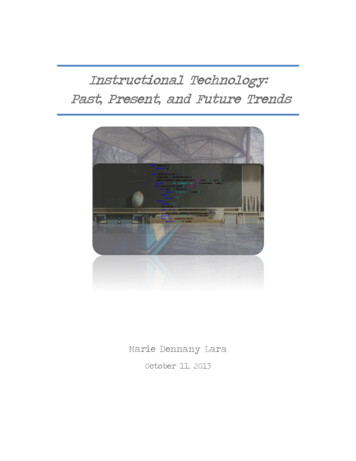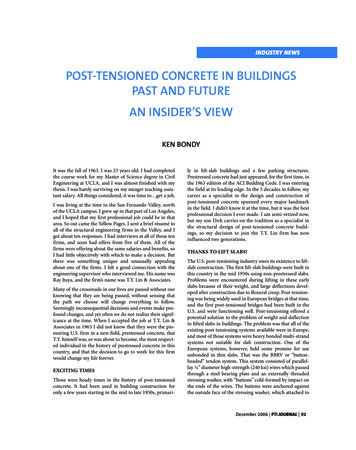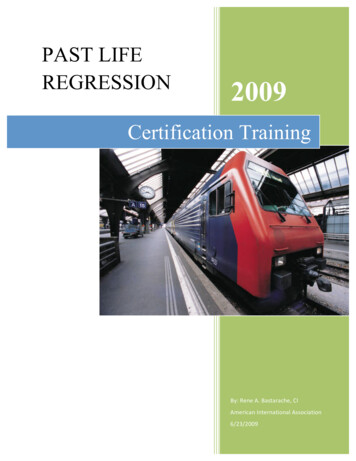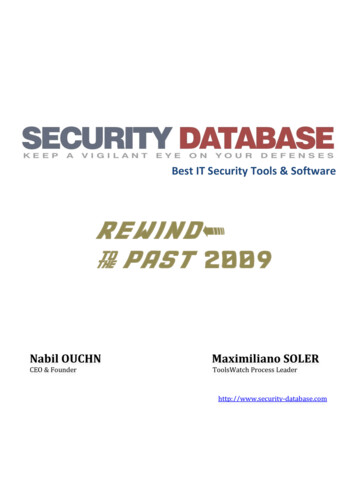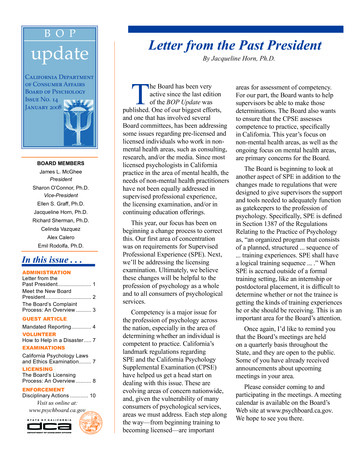
Transcription
B O PupdateCalifornia Departmentof Consumer AffairsBoard of PsychologyIssue No. 14January 2008BOARD MEMBERSJames L. McGheePresidentSharon O’Connor, Ph.D.Vice-PresidentEllen S. Graff, Ph.D.Jacqueline Horn, Ph.D.Richard Sherman, Ph.D.Celinda VazquezAlex CaleroEmil Rodolfa, Ph.D.In this issue . . .ADMINISTRATIONLetter from thePast President . 1Meet the New BoardPresident . 2The Board’s ComplaintProcess: An Overview . 3GUEST ARTICLEMandated Reporting . 4VOLUNTEERHow to Help in a Disaster . 7EXAMINATIONSCalifornia Psychology Lawsand Ethics Examination . 7LICENSINGThe Board’s LicensingProcess: An Overview . 8ENFORCEMENTDisciplinary Actions . 10Visit us online at:www.psychboard.ca.govLetter from the Past PresidentBy Jacqueline Horn, Ph.D.The Board has been veryactive since the last editionof the BOP Update waspublished. One of our biggest efforts,and one that has involved severalBoard committees, has been addressingsome issues regarding pre-licensed andlicensed individuals who work in nonmental health areas, such as consulting,research, and/or the media. Since mostlicensed psychologists in Californiapractice in the area of mental health, theneeds of non-mental health practitionershave not been equally addressed insupervised professional experience,the licensing examination, and/or incontinuing education offerings.This year, our focus has been onbeginning a change process to correctthis. Our first area of concentrationwas on requirements for SupervisedProfessional Experience (SPE). Next,we’ll be addressing the licensingexamination. Ultimately, we believethese changes will be helpful to theprofession of psychology as a wholeand to all consumers of psychologicalservices.Competency is a major issue forthe profession of psychology acrossthe nation, especially in the area ofdetermining whether an individual iscompetent to practice. California’slandmark regulations regardingSPE and the California PsychologySupplemental Examination (CPSE)have helped us get a head start ondealing with this issue. These areevolving areas of concern nationwide,and, given the vulnerability of manyconsumers of psychological services,areas we must address. Each step alongthe way—from beginning training tobecoming licensed—are importantareas for assessment of competency.For our part, the Board wants to helpsupervisors be able to make thosedeterminations. The Board also wantsto ensure that the CPSE assessescompetence to practice, specificallyin California. This year’s focus onnon-mental health areas, as well as theongoing focus on mental health areas,are primary concerns for the Board.The Board is beginning to look atanother aspect of SPE in addition to thechanges made to regulations that weredesigned to give supervisors the supportand tools needed to adequately functionas gatekeepers to the profession ofpsychology. Specifically, SPE is definedin Section 1387 of the RegulationsRelating to the Practice of Psychologyas, “an organized program that consistsof a planned, structured . sequence of. training experiences. SPE shall havea logical training sequence . .” WhenSPE is accrued outside of a formaltraining setting, like an internship orpostdoctoral placement, it is difficult todetermine whether or not the trainee isgetting the kinds of training experienceshe or she should be receiving. This is animportant area for the Board’s attention.Once again, I’d like to remind youthat the Board’s meetings are heldon a quarterly basis throughout theState, and they are open to the public.Some of you have already receivedannouncements about upcomingmeetings in your area.Please consider coming to andparticipating in the meetings. A meetingcalendar is available on the Board’sWeb site at www.psychboard.ca.gov.We hope to see you there.
ADMINISTRATIONMeet the New Board PresidentAt the annual Board electionsin May, Mr. James L.McGhee was elected to serveas President of the California Boardof Psychology for 2007–08.In 2003, Mr. McGhee wasappointed by then-Governor GrayDavis to serve as a member of theCalifornia Board of Psychology,a regulatory board under theDepartment of Consumer Affairs. Hewas re-appointed to the Board fora second term by Governor ArnoldSchwarzenegger in May of 2007.Most recently, Mr. McGheeserved as Vice-President of the Boardduring 2006–07. Mr. McGhee haschaired and served on numerouscommittees during his tenure onthe Board, including Outreach andConsumer Education, Legislation,Personnel and Board Operations andEnforcement.For the past 28 years, Mr.McGhee has successfully run hisown business, JLM ManagementGroup. As President and CEO, heuses his business and civic expertiseto help organizations improve allaspects of their business models.Mr. McGhee has an extensivebackground in strategicplanning and organizationaldevelopment. JLMManagement also providesconsultations on strategicplanning, financial andadministrative management,and Board developmentand governance to a myriadof community-basedorganizations.Mr. McGhee’s broadexperience includes beingappointed to the StateLottery Commission inWashington, a delegate tothe White House Conferenceon Small Business, formerCommissioner of the Seattle,Washington Planning Committee,Vice Chair of the Seattle/KingCounty Civil Rights Commission,Vice Chair of the Mental HealthBoard for the City and County ofSan Francisco, a member of theBoard of Directors of the LegislativeBlack Caucus Foundation andwas the National Chair, MinorityEnterprise Development Conference.Mr. McGhee received hisBachelor of Arts in PublicLicensing/Registration Application Processing AlertDue to the unusually high volume of applications, there isan approximate 8-10 week processing period from receiptof the completed application. The Board is aware of thecurrent situation and doing as much as possible to reduce theprocessing time.Please send in your applications as early as possible. Thankyou for your understanding.2BOARD OF PSYCHOLOGY UPDATEAdministration from the Universityof Puget Sound in Tacoma,Washington. He has been publishedin Who’s Who Among BlackAmericans—4th Edition 1985 andhas served honorably in the UnitedStates Army, where he completedassignments in Germany andVietnam.The Board looks forward to anoutstanding year with Mr. McGheeas President of the Board ofPsychology. join the red crosswww.redcross.orgJANUARY 2008
ENFORCEMENTThe Board’s Complaint Process: An OverviewThe California Board ofPsychology (Board) has authorityover licensed psychologists, registeredpsychologists, and registeredpsychological assistants in California.The Board has the authority to enforcethe Laws relating to the Practice ofPsychology, which are part of theCalifornia Business and ProfessionsCode.A complaint received by theBoard will be assigned to anEnforcement Analyst for review.The analyst will gather theinformation necessary to evaluateyour complaint. The initial review ofyour complaint will be undertakenimmediately; however, depending onthe complexity of the case, may takeseveral months to resolve.Complaints received by the Boardinvolving patient care or treatmentrequire the patient/complainant toprovide the Board with a signedauthorization for release of records.This enables the Board to request aresponse from the psychologist andalso allows the psychologist to releaseinformation to the Board withoutbreaching patient confidentiality. TheBoard provides the complainant withthe release form for signature. Therelease form must be completed andsigned to avoid a delay in processinga complaint.Once a completed release form isreceived, the analyst will request theneeded response or records from thepsychologist. Once all records andresponses are received, the analystwill review the information anddetermine whether the complaintrequires further review, reviewJANUARY 2008by a Board expert, referral toinvestigation or to another agency orentity, or closed.If the complaint is forwarded toan expert in the field of psychology,the expert is given time to reviewthe entire complaint and providethe Board with a recommendedcourse of action. The expert mayrecommend that further informationbe gathered from both thecomplainant and the psychologistor just one or the other. He or shemay recommend that the case beforwarded directly to the MedicalBoard’s investigation unit or, if theactions of the psychologist were notbelow the acceptable standard ofcare, the expert will recommend nofurther action be taken and the casewill be closed.If the Board expert finds that thetreatment fell below the standardof care but does not represent anextreme departure from it, thecomplaint will be closed but remainon file with the Board for futurereference. If a complaint is referredto an investigative office and aviolation is confirmed, the case maybe submitted to the Office of theAttorney General for aformal charge that maylead to disciplinary actionagainst the psychologist’slicense.The Board cannot take actionwith respect to matters that occurredmore than seven years ago (withsome limited exceptions), or 10years ago on complaints allegingsexual misconduct, pursuant toSection 2960.05 of the Business andProfessions Code.If you would like more informationon the complaint process or wouldlike an online complaint form,visit the Board’s Web site at www.psychboard.ca.gov and click on the“File a Complaint” link.If you are interested in furtherdetails regarding the Board ofPsychology’s enforcement actions orstatistics, please visit our Web site atwww.psychboard.ca.gov, and click onthe “Enforcement” link.To check on the status of aparticular licensee or registrant ofthe Board visit the Web site at www.psychboard.ca.gov and click on the“Verify a License” link.To discuss your complaint or toobtain answers to enforcement- relatedquestions, please call the Board at(866) 503-3221 or (916) 263-2699,ext. 3317.PLEASE NOTE:Investigations conductedon behalf of the Board ofPsychology are handledby investigators fromthe Medical Board ofCalifornia.BOARD OF PSYCHOLOGY UPDATE3
GUEST ARTICLEMandated Reporting of Suspected Child AbuseMichael Donner, Ph.D. and the 2004 Expertise Series Task ForceReprinted with permission by CPACalifornia law and the American PsychologicalAssociation Ethical Principles Of Psychologists andCode of Conduct (2002) require psychologists to protectconfidentiality. It is a violation of law, and unprofessionalconduct, to disclose confidential information received inpsychotherapy unless permitted to do so by law. The ChildAbuse and Neglect Reporting Act (CANRA) is a law whichmandates or permits certain disclosures in specific situations.Psychologists must keep in mind that CANRA definesmost, if not all, of the terms that apply to the mandate orpermission to report. Some behaviors that psychologists mayconsider abusive will not be defined as such in CANRA.Psychologists must be aware of CANRA’s definitions, andapply those definitions to reporting situations. (Penal CodeSection 11164-11174.4)CANRA makes an important distinction betweenmandated reporting and permissible reporting. Failure tomake a mandated report is illegal, subject to discipline by theBoard of Psychology, and may lead to civil suit. Permissiblereports are left to the psychologist’s discretion andpsychologists are legally permitted to go against the wishesof the child or parent in making them.Psychologists who make mandatory or permissiblereports may be sued but are immune from civil liability ifthey follow the law. The immunity applies to the decisionmaking leading to a report as well as to the report itself.However, the immunity may not apply to post-reportingactions that are outside the scope of the mandated report,such as, taking on an investigative role.Civil immunity does not prevent the Board of Psychologyfrom taking disciplinary action where a psychologist hasmade a frivolous report or has made a report for an improperpurpose. To impose discipline, the Board of Psychologywould need to establish that the psychologist engaged inan extreme departure from the standard of care, not just amistake or error of judgment.MANDATED REPORTINGWhen psychologists acting in their professional capacityhave knowledge or a reasonable suspicion that a child has4been the victim of abuse or neglect as defined by CANRA, anoral and a written report must be completed.Reports should be made as soon as reasonably possible bytelephone. A report may be directed to a Police Department,Sheriff’s Department, or Children’s Protective Services,which are typically a part of the County Welfare Offices. Awritten report (a form for which can be provided by any ofthe above) must be submitted within 36 hours (PC 11166[a]). If the suspected abuse occurred outside of California,the psychologist still must report in California becausepsychologists may not have immunity for reports made toofficials outside of California.DEFINITIONS“Reasonable Suspicion”—This means that the edu-cationand training of psychologists in child abuse and neglectwould lead a reasonable psychologist to suspect abuse. Theremust be some objective basis for suspecting abuse. A hunch,intuition or impression does not constitute an objective basis.“A child has been the victim”—(1) The victim must stillbe a child, not an adult who was victimized as a child. (2)The abuse must have already occurred. A concern that abuseCOULD occur is not reportable.BEHAVIOR THAT MUST BE REPORTED1. Sexual Abuse—Any form of non-consensual sexualactivity between an adult and a child, i.e., someone 18or over with someone under 18. Sexual activity includesany sexual or sexualized behavior that is intended toarouse the sexual desire of either the adult or the child,or sexually exploit the child. This includes intercourse,oral and anal sex, and a wide range of behaviors suchas kissing, touching, fondling or groping (even throughclothing), or showing of pornography (Penal CodeSection 11165.1). A coerced agreement to performsexual acts is not consent.2. Reportable Consensual Sexual Activity - The rulesinvolving CONSENSUAL activity are complicated and notnecessarily intu- itive. These should be read carefully andreferred to as the situation requires. See table for furtherclarification.BOARD OF PSYCHOLOGY UPDATEJANUARY 2008
GUEST ARTICLEa. Any consensual sexual activity between minorswhere one is 15 years old or over and the other is 13 oryounger. This requirement includes the entire range ofsexual activities, and probably includes behaviors thatare normative and even age appropriate. However theCANRA mandates a report.b. Any sexual activity between a child 14 or 15 yearsold and an adult at least 10 years older.c. Sexual intercourse between a child 15 or youngerand someone 21 or over. “Sexual intercourse” is genitalintercourse between a male and a female.d. Anal or oral sex when either partner is a minor 14or older is a mandated report, even when the partneris also a minor, and even when intercourse would bepermissible. For reasons not specified in CANRA, oraland anal sex are treated differently than intercourse.e. SPECIAL NOTE - Voluntary sexual activity of anysort between children who are both under the age of14 years and who are of similar age, maturity, andsophistication is not a mandated report.1 This meansthat younger children can engage in voluntary sexualactivity that would mandate a report if one of the minorswere 14 or older.or grabbing to correct or punish breaches of rules, havebeen found to be acceptable as long as it is not excessiveas described above. (In re Jose M.(1988), People vChecketts (1999) People v. Smith (2002) , Cal.App.4th)4. Neglect—Neglect means risking, causing orpermitting the health of a child to be seriously endangeredby intentionally failing to provide adequate food, clothing,shelter or medical care. The emphasis in this section is onthe severity of the neglect, behaviors that could cause greatbodily harm. The courts have defined “intentionally” to mean“know or should know of the severity of the risk.”(People vSargent, 2002, Section 11165.2.[a],11165.3)WHAT IS NOT A MANDATED REPORTOF PHYSICAL ABUSE?An accidental injury.When an ADULT victim reports abuse that occurredto them when they were a child. Corporal punishment thatdid not cause a physically Traumatic condition and was notexcessive. Parents may use “instruments.” Thus, for example,leaving a red mark by hitting a child with a belt does not, initself, constitute abuse, under a conservative interpretation ofthe law.A positive toxicology screen at the time of the delivery ofan infant is not in and of itself a sufficient basis or reporting3. Physical Abuse—Any injury caused deliberately. Anchild abuse or neglect. (11165.13 [a])accident is not abuse. An injury is defined in CANRA as atraumatic condition. This means serious harm, including cuts,A child receiving treatment by spiritual means as longburns, severe bruises, broken bones, welts or scars.2as the health of the child is not seriously endangered.(11165.2.[b])a. Willful harming or injuring of a child or theendangering of the person or health of a child—ThisA mutual fight between minors.means behaviors in which the probability of seriousPERMISSIBLE REPORTINGflagrant disregard for the health and safety of children,or which result in significant psychological trauma.A psychologist is PERMITTED but not mandated toFor example, a nine year old child was beaten with amake a report only if he or she suspects that a child iswooden dowel so severely she was still bruised andsuffering serious emotional damage or is at a substantialswollen days later.3risk of suffering serious emotional damage in the future(Penal Code Section 11166.05). Examples of evidence ofb. Unlawful corporal punishment—Cruel or inhumanserious emotional damage would include severe anxiety,behavior that causes an injury. Beatings that leftscarsdepression, withdrawal, or agressive behavior. Psychologistsfrom belt buckles, black eyes, dragging a child by thehair, are all examples of unlawful corporal punishment. should note the use of the word SEVERE symptoms, evenPhysical discipline of a child, such as slapping, spanking for PERMISSIBLE reporting. Psychologists who makePERMISSIBLE reports have the same protections as whenmaking MANDATED reports, but those who decide to1Planned Parenthood v. Van de Kampmaintain patient confidentiality by not reporting are also fully2In re Edward C. 1981, In re Jose M, 1988, People v Whitehurst 1992.in compliance with the law.3People v. Jaramillo (1979), Cline v. Superior Court (1982),People v. Valdez (2002)JANUARY 2008BOARD OF PSYCHOLOGY UPDATEMandated Reporting continued on next page5
GUEST ARTICLEREPORTING IN AGENCY ORINSTITUTIONAL SETTINGSDisclaimers:A supervisor or employer may not prevent, or retaliateagainst, a subordinate from making a report. (PC Sec. 11166[g]1)A supervisor or employer may not require a subordinateto tell them if you made a report. (PC Sec. 11166 [g]2)Only one member of a treatment team is required to makea report (PC Sec. 11166[f] ), although all members may if theywish.SPECIAL NOTE:Psychologists must not provide the written child abusereports to anyone other than the agencies previouslydescribed, even if the record has been subpoenaed. To do sois a misdemeanor. (PC 11167.5)This document is educational in nature and is not intendedto replace the advice of an attorney. In addition, althoughthe information in this document was accurate at the timeof publication, psychologists using this information shouldbear in mind that laws and regulations change over timeand that the interpretation of laws and regulations by courtsand the Board of Psychology may change from time totime.The Board of Psychology (Board) is committed to includingguest articles in the BOP Update. The Board of Psychologytakes no responsibility for the accuracy or veracity of anycomments or statements contained in a guest article, andthe Board remains neutral on any position statements madein a guest article.This table indi
Michael Donner, Ph.D. and the 2004 Expertise Series Task Force California law and the American Psycholo


